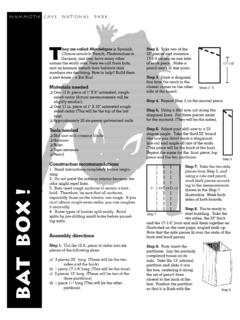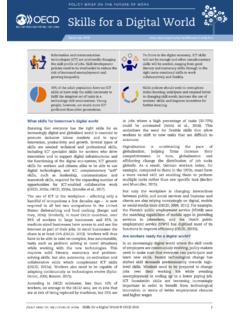Transcription of The Neglected Tropical Diseases: A challenge we …
1 The Neglected Tropical Diseases: a challenge we could rise to will we?Report for the All-Party Parliamentary Group on Malaria and Neglected Tropical Diseases (APPMG)Using presentations made to the APPMG 2008/9 Chairman: Stephen O Brien MPVice-Chairmen: Dr Evan Harris MP, Lord Rea, David Drew MP Treasurer: Ashok Kumar MP Secretary: Eleanor Laing MP Coordinator: Susan DykesWebsite: s Foreword iiiAcknowledgments v1 Introduction: The Neglected Tropical Diseases 12 Group One controlled by Mass Drug Administration 2 23 Group Two Case finding and treatment 3 74 Group Three Animal Zoonotic Diseases 4 95 Lessons learnt from the Speakers 106 Conclusions and Recommendations of the APPMG 11 Annex 1 Summary of presentations 12 Bibliography 15 Figures Figure 1 Child with intestinal helminths 2 Figure 2 Successful early deworming of children stimulates growth 2 Figure 3 Coverage leaves a lot to be achieved 3 Figure 4 Worms from a child 3 Figure 5 Bloody urine caused
2 By Schistosoma haematobium 3 Figure 6 Advanced Schistosoma mansoni infection causes ascites 3 Figure 7 Sighted children lead blind adults 4 Figure 8 Lymphatic filariasis causes swelling of limbs 4 Figure 9 Lymphatic filariasis causes swelling of the scrotum 5 Figure 10 Central African countries still need LF elimination programmes 5 Figure 11 Flies cause chlamidia infection leading to trachoma 6 Figure 12 Trachoma causes eye damage 6 Figure 13 Guinea worm infection 6 Figure 14 Man with leprosy 7 Figure 15 Cutaneous leishmaniasis 7 Tables Table 1 The NTDs 1 Table 2 The Pharmaceutical company donations 10 Chairman s ForewordHouse Of Commons The All-Party Parliamentary Group on Malaria and Neglected Tropical DiseasesI am pleased to introduce and endorse the latest in our series of authoritative and influential reports: the All-Party Parliamentary Group on Malaria and Neglected Tropical Diseases (APPMG s) Fifth Report entitled:The Neglected Tropical Diseases: a challenge we could rise to will we?
3 For the first time since the APPMG was established, we focus our report outside the Malaria field. During the last two years our meetings have been attended by more and more biomedical scientists, particularly parasitologists, interested in the wider Tropical health spectrum beyond Malaria. In particular presentations by Sir Roy Anderson, Professor David Molyneux, Dr. Lorenzo Savioli and Professor Alan Fenwick convinced us to turn our attention to these Neglected Tropical Diseases (NTDs), in addition to all our continuing work on case for more investment in the control of the NTDs has been promoted by a group of international scientists who have each worked on individual diseases for many years, developing and validating tools for their control.
4 Armed with proven strategies they have now combined their efforts to advocate how (not whether) we rid the world of some of the NTDs, and how we put in place control measures for other NTDs. As you read this repor t, you will be taken aback at the unbelievably complicated life cycles and the horrific and tragic consequences of these infections mostly unknown in the Western world in children malnutrition and stunting of growth, and later in life blindness, deformity, urinary tract and intestinal damage, swellings of limbs to gross proportions, anaemia, and cancer.
5 The APPMG meetings during 2008 and 2009 have on several occasions been dedicated to NTDs. Speakers have professionally presented the evidence describing the suffering caused, and quantifying the burden of disease , which remarkably has been shown to be as high as Malaria and TB in terms of Disability Life Years lost. They have described the complex life cycles of the parasites which infect humans and sometimes their animals. They have stressed how these diseases affect the poorest of the poor who cannot afford treatment, and they have described how the pharmaceutical industry have come to the aid of these vulnerable populations by providing drugs free of charge.
6 There is still a funding gap and money is needed for new drug development for some diseases. For other diseases funds are required for advocacy, for training, for drug distribution from the ports to the points of delivery, for health education, for delivery through schools, health centres or community selected drug distributors, and finally for monitoring and evaluation. However, the funding gap for all these activities is relatively smaller than the amounts required for HIV/AIDs, TB and Malaria. Despite that smaller demand, filling that gap is still proving to be problematic despite calls from the Commission for Africa, the G8, the UN Secretary General and the WHO Secretary General and contributions from USAID and massive numbers of people infected with NTDs live mainly in sub-Saharan Africa, although there are still infected populations in Asia, the Pacific, Central and South America.
7 Because NTDs are not necessarily perceived as being responsible for the major burdens of disease as they are not serious causes of death, they are nonetheless an integral cause of poverty preventing progress on the Millennium Development Goals. To achieve the MDGs, NTDs will need to be controlled, and that control to be sustainable. If this can be achieved, a heavy burden on vulnerable economies will be : Stephen O Brien MPVice-Chairmen: Dr Evan Harris MP, Lord Rea, David Drew MP Treasurer: Ashok Kumar MP Secretary: Eleanor Laing MP Coordinator: Susan DykesWebsite: APPMG has played a major role in raising the awareness of NTDs.
8 It has been heartening to see the group expand not only in its remit, but also in addressing a wider number of attendees as well as the variety of speakers and subjects. So the Group is now called the All-Party Parliamentary Group on Malaria and Neglected Tropical Diseases (retaining its abbreviation APPMG). It remains a lively forum where, at least monthly, new ideas, technologies, methods and field work can be explained and debated from across the spectrum of all those involved in the battle against Malaria and the NTDs. The UK Government and the Opposition Parties are now all equally committed to Malaria control and DFID has become one of the leading government departments in helping to bring tools to communities who need them.
9 We still maintain that we must control Malaria in the highest transmission areas of sub-Saharan Africa and eliminate the disease country by country, as we all work together to shrink the map of Malaria. It is vital that this political will is maintained to sustain the long term commitment required. However while this is being done our presenters have also shown that with a smaller and cost effective intervention of just 50 pence or less per person per year, many less lethal Tropical diseases could be eliminated or reduced in prevalence and intensity of infection.
10 We must not forget them because their control would alleviate the suffering on many millions, improve their quality of life, and to school-aged children give them a healthier start to life. Additionally, NTD infections may make children more susceptible to Malaria and HIV, and less likely to respond positively to vaccinations against a range of addition to all the contributors, the Officers and Members of the APPMG are deeply grateful to Professor Alan Fenwick of the Schistosomiasis Control Initiative (SCI, Imperial College) for his expertise and hard work in producing this report.


















